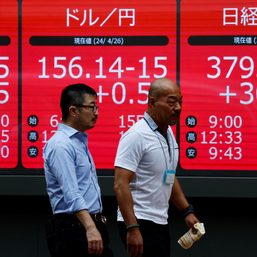SUMMARY
This is AI generated summarization, which may have errors. For context, always refer to the full article.

European Central Bank (ECB) President Christine Lagarde said on Wednesday, September 30, that the eurozone should have an inflation goal “that the public can easily understand” and is calculated in a way that better reflects people’s everyday lives.
The ECB currently has an inflation target of “close to, but below” 2%, a goal agreed in 2003 when rapid price increases were a real concern.
Inflation in the 19-nation eurozone has however stayed stubbornly low for years despite unprecedented economic stimulus from the ECB, keeping the target well out of reach and fueling calls for a rethink.
“We should have an inflation aim that the public can easily understand,” Lagarde told a conference in Frankfurt.
The ECB has recently resumed a “strategic review” of its tools and goals, after a brief pause forced by the coronavirus pandemic.
Results are not expected until September 2021, but they could lead to a major overhaul of the bank’s policies and priorities.
Lagarde said any future definition of the inflation target should be “perceived to be symmetric by the public,” meaning the ECB might tolerate inflation above 2% after a period of undershooting the target.
“Lagarde’s comments suggest that anything like average inflation targeting could be too complicated and that she prefers something like ‘around 2%,'” ING bank economist Carsten Brzeski told Agence France-Presse.
Pursuing a less strict inflation target would follow in the footsteps of the United States Federal Reserve which last month pledged more leeway, allowing inflation to rise above 2% “for some time” before raising interest rates, so as to boost employment.
The ECB’s strategic review will also consider whether inflation should be measured in a different way, possibly including new indicators such as housing costs.
“We need to keep track of broad concepts of inflation that capture the costs people face in their everyday lives and reflect their perceptions, including measures of owner-occupied housing,” Lagarde said.
“This is not about moving the goalposts for monetary policy. It is about future-proofing how we measure inflation.”
But there was immediate pushback from German central bank chief Jens Weidmann, a member of the ECB’s governing council and frequent critic of its ultra-loose monetary policy.
“The more widely we interpret our mandate, the greater the risk that we will become entangled with politics and overburden ourselves with too many tasks,” he told the same Frankfurt event.
“As a consequence, our independence might be called into question, and rightly so.” – Rappler.com
Add a comment
How does this make you feel?






![[OPINION] A rebellion long overdue](https://www.rappler.com/tachyon/2024/06/mass-uprising-matrix-june-4-2024.jpg?resize=257%2C257&crop_strategy=attention)



There are no comments yet. Add your comment to start the conversation.